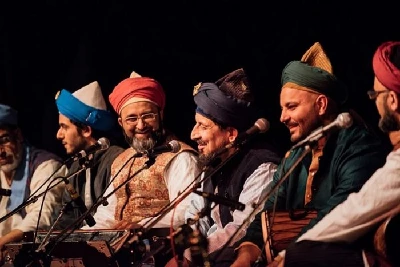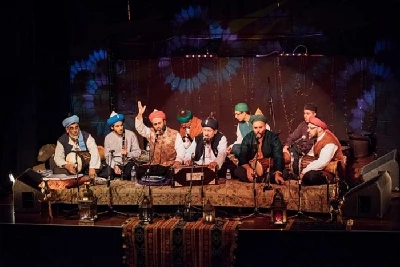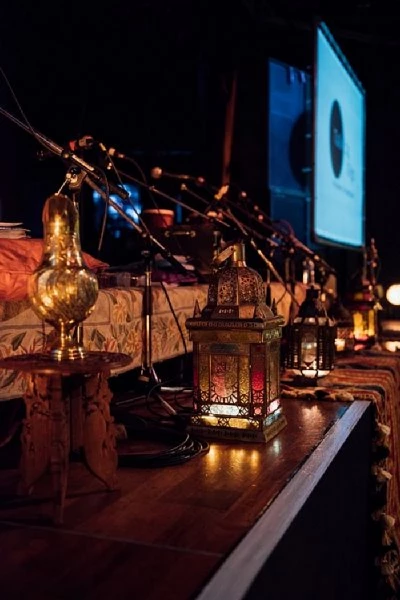Shahe Marden
-
TalkingGigs, The Hubs, Sheffield, 22/3/2017
published: 19 /
4 /
2017

In an evening of conversation and music at a TalkingGigs show in Sheffield, guest reviewer Celia Mather watches Qawwali musicians Shahe Marden play a spellbinding set
Article
There were moments when, sitting in the bare, modernistic architecture of the HUBS in Sheffield on a cold, wet English night, I could imagine myself in a sun-lit stone palace somewhere in South Asia, perhaps even centuries ago. And, as we were told, that is indeed what Qawwali music aims to do: to transport you elsewhere, free from the 'here and now'. Part of the Sufi form of Islamic belief, it encourages you into a different state of mind - in particular one where you are open to receiving what Sufis believe is a universal energy of peace and love.
Shahe Mardan is a group of five musicians from the cities of Sheffield and Bradford, joined on the night by four more. They are steeped in the tradition of this centuries-old form of belief and its associated music which originated in Persia (now Iran) and moved on to become very significant across South Asia. Their lead singer and harmonium player Mohamed Zubair accompanied the late Nusrat Fateh Ali Khan, well-known for helping to bring Qawwali music to the 'world music' scene.
They are also proud of their connection to the late Sufi master Sheikh Nazim. It was he who gave them their name (meaning 'King of Men') and who told them to take their music not just to other believers but also to new audiences. So this is what they have been doing, recently playing for some 2000 at a gig in London, as well as the 160+ of us at this event. Later in 2017 they will be touring Europe too.
In the first half, we had the 'talking' bit when we learnt more about Sufism and the role of Qawwali music in it. At the same time, it became clear how very warm and down-to-earth the band members are.
Second singer Camran Munir told us that Sufism comes from the Prophet Mohammed via Sheikh Nazim who was "known for his compassion, clemency, knowledge of the world around him, and with the celestial aim of bringing people to an ocean of love, steering us away from harm to oneself and others". This, he added, is the "kernel of Islam".
Qawwali music comes not only from the musicians' voices, instruments and clapping, he said, but also from the heart. It is not a 'performance of songs' but a 'journey'. One single piece can last for up to 2.5 hours long, and indeed 'Qawwali' means 'keep on saying'. The intention is to take people away from the 'now', often into trances. Camran called it "inebriation without the alcohol", raising a laugh.
Given the unusual experience for them of having Q&A too, in the first half the band chose to play shorter pieces - including a warm-up well-known in the Indian sub-continent, and a 'raga' famous during British colonial times and sung by maharajas in their palaces.
Camran also talked us through a short film clip of Qawwali musicians in an informal setting, in the home of a nephew of the late Nusrat Fateh Ali Khan in Pakistan. It shows an all-male audience, happy and enthusiastic, and coming together on particular pulses in the music and throwing money at the musicians in response: https://www.youtube.com/watch?v=z0jElBhUg7c There are women Qawwali musicians, we were told, but they tend to be individual singers.
In Qawwali, the words are very important, Camran said. As well as Persian and Arabic, they can be in languages from Pakistan and India, such as Urdu and Punjabi. Qawwali songs can be in praise of Allah, the Prophet Mohammed, and Sufi saints, but also death laments, love songs, and poems. In the second half, they sang several of these types, plus one which sent an SOS message to God to help anyone in urgent need among those present. However, the band members do not see themselves as telling people what to think. "Our only aim is to spread peace and love among audiences", Camran said. In any case, the lyrics often have multiple meanings, and "it is up to the audience to interpret the poetry how they wish".
At this gig, like many that the band do, the vast majority of us could not in any case understand what was being sung. However, as the second half got going, with soaring vocal tones and repetition in the call and response, alongside pounding, intricate rhythms, it was clear that the audience started to feel the positive energy flowing. Towards the end, many were clapping along and a Sufi companion to the band took to the floor, spinning for many minutes at a time. No-one else danced but it did feel like many were transported in their seats. At the end, the band received a standing ovation.
One friend later said to me that she had come across some reluctance among friends to come to hear such deeply religious music. Her response had been that we 'non-believers' do often go to concerts with a Christian heritage, not just to 'enjoy' but perhaps to experience something more profound. So surely we can do this with music from other religions too? And on this occasion it seems that many of us did.
Plus it was a 'two-way' thing. Band members afterwards told me that it is rare that they have such an opportunity to tell more of the 'story' behind their music. And receiving such interest, warmth and enthusiasm from the audience meant that the energy flowed back to them.
Then we were all brought 'back to earth' as we headed off home through the cold night drizzle.
This article was originally published at TalkingGigs https://www.talkinggigs.co.uk/
Article Links:-
https://www.talkinggigs.co.uk/
Picture Gallery:-

